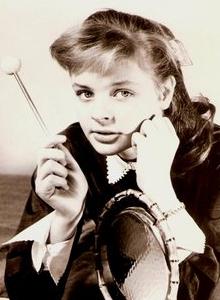She’s an ancient place name with a romantic quality – and a challenging association.
Thanks to EK and Photoquilty for suggesting Sabine as Name of the Day.
Like Delphine, Sabine is a place name heavy with meaning.
History tells us that the Sabines were a tribe established long before the founding of Rome. The Sabines’ original territory was called first Sabininum, and today is known as Sabina, northeast of Rome.
Legend has it that the founders of Rome needed wives, but the Sabine elders declined to marry their girls to the interlopers. So the Romans threw a party, and invited everyone. But it was a ruse to bride-knap their future wives.
It’s known as the Rape of the Sabine Women.
Writers like Livy tell us that it all ended happily ever after. That seems unlikely, but who knows? The women left behind no written records of their experiences. Noble Roman families sometimes bestowed Sabinus and Sabina on their offspring to indicate descent from the ancients.
Artists have been big on the scene ever since, with everyone from Rubens in the seventeenth century to Picasso in the twentieth depicting the drama.
It makes for one of those unsavory associations – who wants their daughter’s name to be associated with the word rape?
Sabine did enjoy a rush of popularity in mid-20th century Germany. Which reminds me – Americans would pronounce them sah BEEN and sah BEEN ah, German speakers would say the -ine and -ina endings the same way.
Sabine Sinjen is the ingenue pictured to the right. She was a successful German actress. In the late 1950s, she played a string of naive teenagers, like Ilse in Mädchen in Uniform with Romy Schneider. She’s not well known in the US, but probably explains the spike in girls called Sabine in Germany.
Other notables include:
- Thornton Wilder’s Pulitzer Prize-winning 1942 drama “The Skin of Our Teeth” starred Tallulah Bankhead as Sabina, the pessimistic housemaid/beauty queen who utters the line that gives the play its title.
- In 1991, Nick Bantock made waves with the debut of his first Griffin and Sabine novel, which is actually a series of postcards and pull-out letters. Bantock’s books appear to have fueled the rise of Griffin in the 1990s.
- Ann Patchett’s 1997 novel The Magician’s Assistant is about a Sabine.
There were also ancient Sabinas aplenty, including several Roman noblewomen. Hadrian was married to a Sabina – apparently unhappily.
Early saints answer to Sabina, Sabinus and Sabinian. The most famous is probably St. Sabina, converted by her maid, Seraphia, and martyred in a Roman persecution. The basilica named in her honor – Santa Sabina – still receives visitors on Aventine Hill.
Sabine has never charted in the US Top 1000. Sabina last appeared in 1926. But they share sounds with choices like Sabrina, Serena, and Selena, all of which have garnered some attention in recent decades. No wonder, then, that Sabine seems to quietly gaining in use.
She’s also decidedly international. While she’s never been huge in English, forms of the name are in use in Eastern European languages, as well as Spanish and Italian.
If you’re not troubled by the ancient association, Sabine could be a lovely, tailored name, rich with history and seldom heard in the US.






I am a Sabine. The name was given to me by my German parents. It’s unique here in the USA. Many people comment how much they like my name.i pronouns it the German way.
I love the name Sabine. I first noticed it in Tamora Pierce’s Mastiff series (her most recent Tortall books); Sabine was a lady knight and a friend of the heroine, Beka Cooper. I heard it again in Rachel Vincent’s Soul Screamers series (about a banshee and her friends); Sabine was the ex-girlfriend of the heroine’s boyfriend. Also, it’s a parish name in Louisiana!
I’ve always liked this for a girl, even though the only person I’ve ever heard of with the name was a guy! I found it in a hymnal, the man’s full name being Sabine Baring-Gould, born 1834. He wrote “Onward Christian Soldiers” among other hymns.
So while most people’s association is with the ancient, mine is a little newer, at least.
Not so find of this one. It’s the been/bean part of the pronunciation that I just can’t like. Though I do like other -een ending names like Irene. It’s the bean that gets me.
I am from England and my name has always been pronounced as “Sa-been-a”, which is the German pronunciation rather than the French, which is “Sa-been”.
When I was younger, I didn’t used to like my name because everyone pronounced my name incorrectly, especially in primary school. I was very aware that my name was not popular and was strange in comparison to school mates.
However, as I’ve grown older, I have learnt to love my name because it is unusual, rare and everyone I know now can pronounce it properly so there are no problems anymore in that aspect.
In terms of nicknames, in the past I have been called “Bean” by close relatives as a term of affection when I was little, but most people just call me by my full name – which is what I prefer, since I’m not a big fan of nicknames – but this is just my personal opinion.